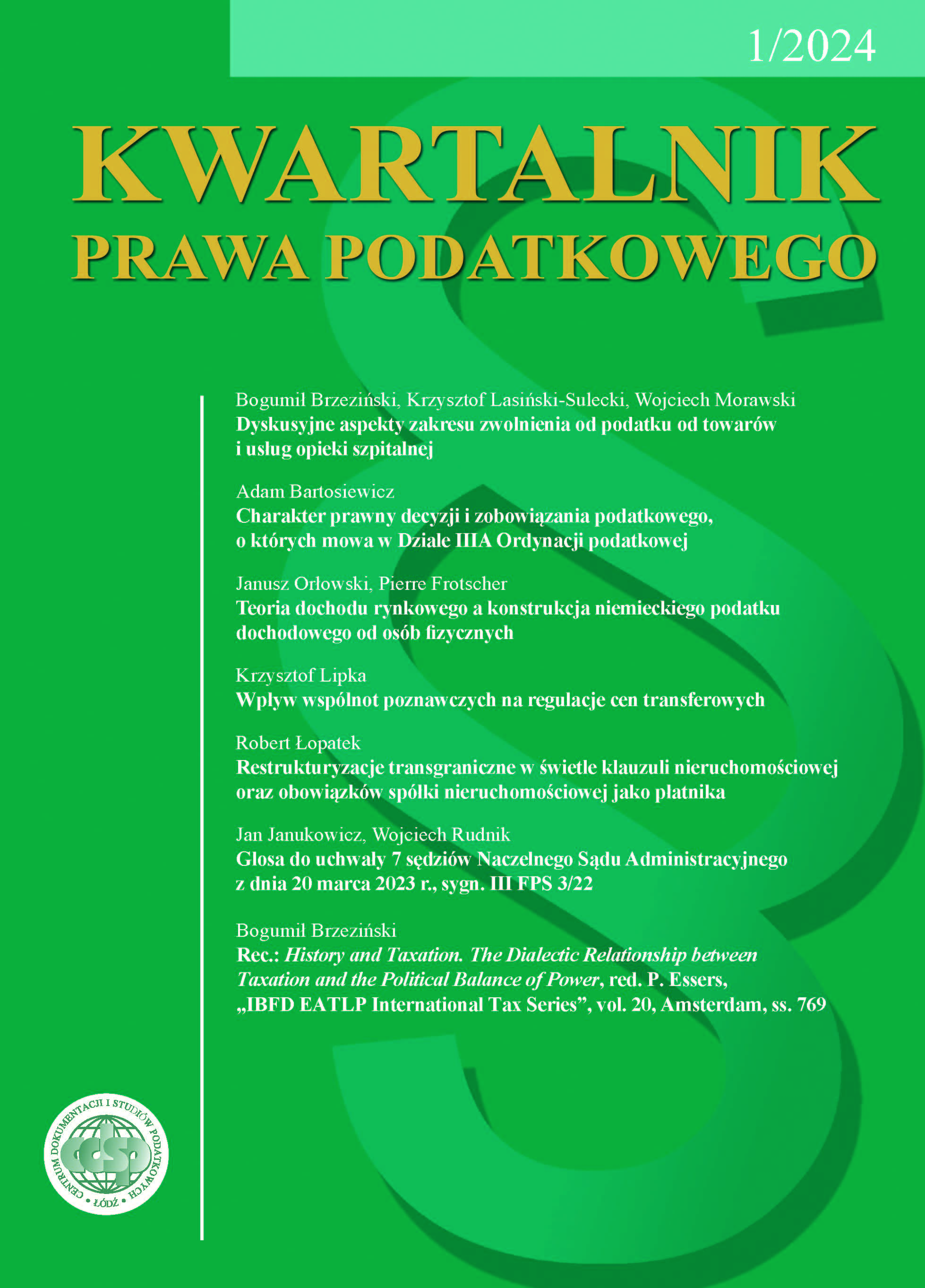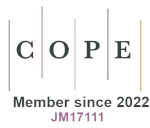Wpływ wspólnot poznawczych na regulacje cen transferowych
DOI:
https://doi.org/10.18778/1509-877X.2024.01.04Słowa kluczowe:
ceny transferowe, wspólnoty poznawcze, światowy ład podatkowyAbstrakt
Artykuł analizuje wpływ wspólnot poznawczych na procesy tworzenia i recepcji standardów cen transferowych. Standardy te opracowywane są niemal wyłącznie w jednej organizacji – OECD. Wzorce są następnie inkorporowane do systemów prawnych poszczególnych państw. W efekcie normy krajowe są odzwierciedleniem rozwiązań tworzonych przez międzynarodowych ekspertów tej organizacji.
Zarówno na proces tworzenia standardów, jak i ich recepcję do prawa krajowego znaczący wpływ mają krajowe i międzynarodowe wspólnoty poznawcze. Narzucają one formę dyskursu i ograniczają wpływ osób spoza wspólnoty na ostateczny kształt rozwiązań. Stan taki ułatwia powstawanie jednolitych rozwiązań globalnych, jednak rodzi wiele poważnych wątpliwości związanych z demokratyczną kontrolą tworzenia prawa, dominacją rozwiązań korzystnych dla krajów wysoko rozwiniętych czy też kwestią lobbingu.
Pobrania
Bibliografia
Alwasiak S., Lewandowska-Kalina M., Kalina L., Kowalewski O., Możdzeń M., Rybiński K., Interes publiczny a interesy grupowe w polskim ustawodawstwie, „Ekonomista” 2014, nr 3.
Google Scholar
Avi-Yonah R.S., Benshalom I., Formulary Apportionment: Myths and Prospects – Promoting Better International Policy and Utilizing the Misunderstood and Under-Theorized Formulary Alternative, 2011, https://repository.law.umich.edu/cgi/viewcontent.cgi?article=2180&context=articles (dostęp: 19.05.2023).
Google Scholar
Brugger F., Engebretsen R., Defenders of the status quo: making sense of the international discourse on transfer pricing methodologies, „Review of International Political Economy” 2022, vol. 29(1).
Google Scholar
Christensen R.S., Hearson M., The new politics of global tax governance: taking stock a decade after the financial crisis, „Review of International Political Economy” 2019, vol. 26(5), https://doi.org/10.1080/09692290.2019.1625802
Google Scholar
Davis Cross M.K., Rethinking epistemic communities twenty years later, „Review of International Studies” 2013, vol. 39(1), https://doi.org/10.1017/S0260210512000034
Google Scholar
Dellis K., Sondermann D., Lobbying in Europe: New Firm-Level Evidence, „ECB Working Paper Series” 2017, no. 2071, https://doi.org/10.2139/ssrn.2984891
Google Scholar
Dumała A., Wspólnoty epistemologiczne i koalicje adwokackie w systemie Unii Europejskiej, [w:] Poziomy analizy stosunków międzynarodowych, red. M. Haliżak, M. Pietraś, Lublin 2012.
Google Scholar
Dunlop C., Epistemic communities and two goals of delegation: Hormone growth promoters in the European Union, „Science and Public Policy” 2010, vol. 37(3), https://doi.org/10.3152/030234210X497681
Google Scholar
Farnsworth K., Fooks G., Corporate Taxation, Corporate Power, and Corporate Harm, „The Howard Journal” 2015, vol. 54(1), https://doi.org/10.1111/hojo.12112
Google Scholar
Grinberg I., The new international tax diplomacy, „Georgetown Law Journal” 2017, vol. 104(5).
Google Scholar
Haas P., Introduction: Epistemic Communities and International Policy Coordination, „International Organization” 1992, vol. 46(1).
Google Scholar
Hearson M., The United Nations Practical Manual on Transfer Pricing: a bluffer’s guide, 2013, https://martinhearson.net/2013/06/06/the-united-nations-practical-manual-on-transfer-pricing-a-bluffers-guide/ (dostęp: 10.05.2023).
Google Scholar
Henriksen L.F., Seabrooke L., Controlling governance issues in professional-organizational networks, [w:] Global Networks and European Actors. Navigating and Managing Complexity, red. G. Christou, J. Hasselbalch, London 2021, https://doi.org/10.4324/9781003153382-5
Google Scholar
Himmick D., Brivot M., Carriers of ideas in accounting standard-setting and financialization: The role of epistemic communities, „Accounting, Organizations and Society” 2018, vol. 66, https://doi.org/10.1016/j.aos.2017.12.003
Google Scholar
Hoff W., Nauczenie prawa. Dwa słowa. Dwie zagadki, „Krytyka Prawa” 2020, nr 2.
Google Scholar
Kumar S., Pandey N., Lim W.M., Chatterjee A.N., Pandey N., What do we know about transfer pricing? Insights from bibliometric analysis, „Journal of Business Research” 2021, vol. 134, https://doi.org/10.1016/j.jbusres.2021.05.041
Google Scholar
Langbein S.I., Cognitive Capture, Parliamentary Parentheses, and the Rise of Fractional Apportionment, „Tax Management International Journal” 2010, vol. 39.
Google Scholar
Lipka K., Ceny transferowe. Standardy. Charakter prawny. Mechanizmy tworzenia, Warszawa 2023.
Google Scholar
Lovett C., The Role of the Tax Practices of Multinational Corporations in Relation to Worldwide Inequality and Underdevelopment, b.r., http://www.academia.edu/10686584/The_Role_of_the_Tax_Practices_of_Multinational_Corporations_in_Relation_to_Worldwide_Inequality_and_Underdevelopment?mail_work_card=title (dostęp:10.02.2023).
Google Scholar
Mavrot C., Sager F., Vertical Epistemic Communities in Multilevel Governance, „Policy and Politics” 2016, vol. 46(3).
Google Scholar
Modzelewski W., Tworzenie materialnego prawa podatkowego – refleksje konstytucyjne, [w:] Konstytucyjne uwarunkowania tworzenia i stosowania prawa finansowego i podatkowego, red. P.J. Lewkowicz, J. Stankiewicz, Białystok 2010.
Google Scholar
Możdżeń M., Alwasiak S., Rybiński K., Kowalewski O., Lewandowska-Kalina M., Rola grup interesów w procesie stanowienia prawa w Polsce, Warszawa 2012, http://dx.doi.org/10.2139/ssrn.2372271
Google Scholar
Nowak-Far A., Prawo Unii Europejskiej. Języki, struktury, działanie w praktyce, Warszawa 2020. OECD, Forum on Tax Administration, b.r., http://www.oecd.org/tax/forumon-tax-administration/ (dostęp: 10.05.2023).
Google Scholar
OECD, Tax Inspectors Without Borders, b.r., http://www.tiwb.org (dostęp: 10.05.2023).
Google Scholar
Pankiv M., Contemporary Application of the Arm’s Length Principle in Transfer Pricing, Amsterdam 2017.
Google Scholar
Quack S., Organizing counter-expertise: critical professional communities in transnational governance, [w:] The organization of the expert society, red. A. Werr, S. Furusten, New York 2016.
Google Scholar
Raburski T., Autonomizacja prawa wobec państwa w sferze międzynarodowej, Poznań 2012.
Google Scholar
Radcliffe V.S., Spence C., Stein M., Wilkinson B., Professional repositioning during times of institutional change: The case of tax practitioners and changing moral boundaries, „Accounting, Organizations and Society” 2018, vol. 66, https://doi.org/10.1016/j.aos.2017.12.001
Google Scholar
Richter B.K., Samphantharak K., Timmons J.F., Lobbying and Taxes, „American Journal of Political Science” 2009, vol. 53(4), https://doi.org/10.1111/j.1540-5907.2009.00407.x
Google Scholar
Rocha S., The Other Side of BEPS: “Imperial Taxation” and “International Tax Imperialism, [w:] Tax Sovereignty in the BEPS Era, red. S. Rocha, A. Christians, Alphen aan den Rijn 2017.
Google Scholar
Rogers H., Oats L., Transfer pricing: changing views in changing times, „Accounting Forum” 2022, vol. 46(1), https://doi.org/10.1080/01559982.2021.1926778
Google Scholar
Salzman J., Labor Rights, Globalization and Institutions: The Role and Influence of the Organization for Economic Cooperation and Development, „Michigan Journal of International Law” 2000, vol. 4, https://doi.org/10.2139/ssrn.259911
Google Scholar
Seabrooke L., Wigan D., Powering ideas through expertise: professionals in global tax battles, „Journal of European Public Policy” 2016, vol. 23(3), https://doi.org/10.1080/13501763.2015.1115536
Google Scholar
Sebele-Mpofu F., Mashiri E., Schwartz S.C., An exposition of transfer pricing motives, strategies and their implementation in tax avoidance by MNEs in developing countries, „Cogent Business & Management” 2021, vol. 8(1), https://doi.org/10.1080/23311975.2021.1944007
Google Scholar
Sikka P., Willmott H., The tax avoidance industry: accountancy firms on the make, „Critical Perspectives on International Business” 2013, vol. 9(4), https://doi.org/10.1108/cpoib-06-2013-0019
Google Scholar
Tchórzewski M., Podatek dochodowy od osób prawnych a sprawiedliwość podatkowa, [w:] Kierunki ewolucji opodatkowania dochodów osób prawnych i innych jednostek organizacyjnych, Warszawa 2022.
Google Scholar
Tchórzewski M., Podatek dochodowy od osób prawnych a sprawiedliwość podatkowa w kontekście wykładni prawa, „Doradztwo Podatkowe – Biuletyn Instytutu Studiów Podatkowych” 2022, nr 8, https://doi.org/10.5604/01.3001.0015.9748
Google Scholar
Valadao M., Lopes R., Transfer Pricing in Brazil and Traditional OECD Approach, „International Taxation” 2013, vol. 8.
Google Scholar
WCO Guide to Customs Valuation and Transfer Pricing, 2018, http://www.wcoomd.org/-/media/wco/public/global/pdf/topics/key-issues/revenue-package/wco-guide-to-customs-valuation-and-transfer-pricing.pdf?la=en (dostęp: 5.06.2020).
Google Scholar
Weible Ch.M., Sabatier P.A., Jenkins-Smith H.C., Nohrstedt D., Henry A.D., deLeon P., A Quarter Century of the Advocacy Coalition Framework: An Introduction to the Special Issue, „The Policy Studies Journal” 2011, vol. 39(3), https://doi.org/10.1111/j.1541-0072.2011.00412.x
Google Scholar
Woodward R., The evolution of the international corporate tax regime, 1920–2008, 2018, http://www.elgaronline.com/display/edcoll/9781788114967/9781788114967.00009.xml (dostęp: 5.06.2023).
Google Scholar
Weible Ch.M., Sabatier P.A., Jenkins-Smith H.C., Nohrstedt D., Henry A.D., deLeon P., A Quarter Century of the Advocacy Coalition Framework: An Introduction to the Special Issue, „The Policy Studies Journal” 2011, vol. 39(3), https://doi.org/10.1111/j.1541-0072.2011.00412.x
Google Scholar
Woodward R., The evolution of the international corporate tax regime, 1920–2008, 2018, http://www.elgaronline.com/display/edcoll/9781788114967/9781788114967.00009.xml (dostęp: 5.06.2023).
Google Scholar
Opublikowane
Wersje
- 2024-07-05 - (2)
- 2024-03-30 - (1)
Jak cytować
Numer
Dział
Licencja

Utwór dostępny jest na licencji Creative Commons Uznanie autorstwa – Użycie niekomercyjne – Bez utworów zależnych 4.0 Międzynarodowe.
PlumX metrics









